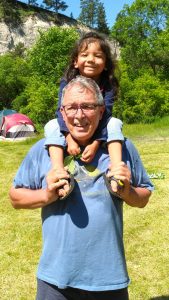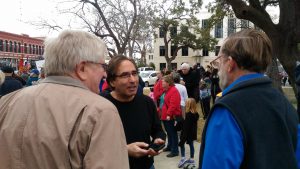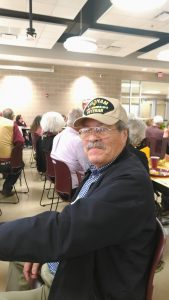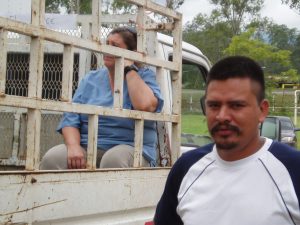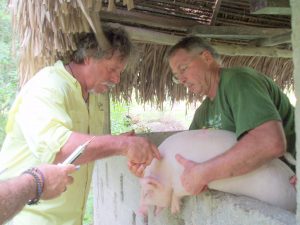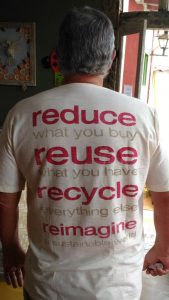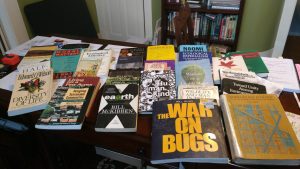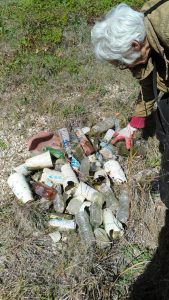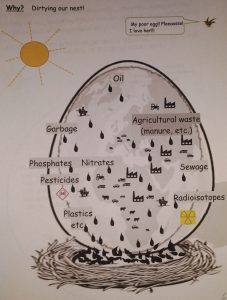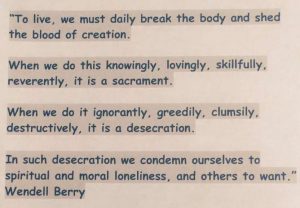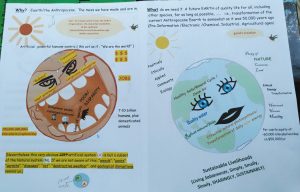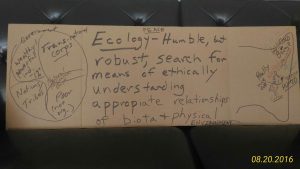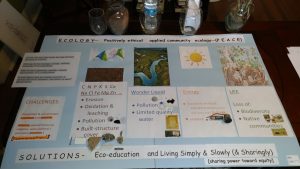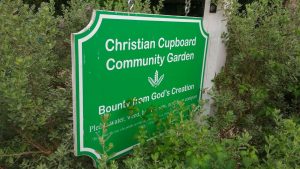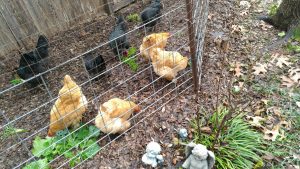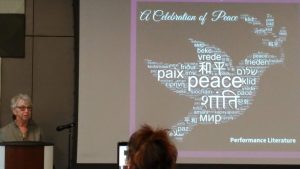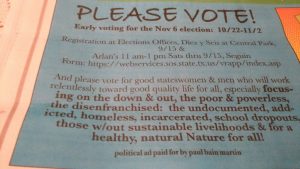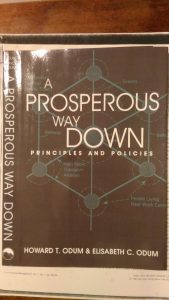“Dime con quien andas y te dire quien eres” “Entre menos burros, mas elotes”
Wawrzyniec* meditated peacefully that Thursday morning in the iconic place of Holy Family, along with 10-20 percent of the population of the village of Nazareth (rural, mostly Catholic German-Americans; population, 309). And then suddenly! … An epiphany!! (Wawrzyniec has many.)
Wawrzyniec’s thoughts came together conclusively, “This is the way it ought to be! A world like this little church/this little village. … A ‘community’ of living beings coming together regularly to meditate and communicate and work toward building consensus and quality life for ‘all’ for as long as possible!!”
Wawrzyniec actually considered himself to be an agnostic, and thought that those who considered themselves to be theist or atheists must –either be lying to themselves –or be quite arrogant –or both! He personally could never be sure! … This was so despite the sometimes painful cadence in his mind of the sermons of his Down Easter friend and pastor in Tifton, Georgia in the 1970s. Franciscan(!!) (but Mainer) Father Rayner could preach hell-fire and brimstone, and oftentimes used Revelation 3:16—
“So because thou art lukewarm, and neither hot nor cold,
I will spew thee out of my mouth.”
Nevertheless Wawrzyniec fondly contemplated on how he’d been influenced by a local culture of Catholicism and its teachings in St. Joseph’s parish in Devine, Texas. … And as he reflected, his thoughts bounced around erratically in his head, and his mind often wandered:
• “I do (I think) possess a strong belief in community, the village, teamwork, and a need oftentimes for quiet acquiescing.”
• “It is good to dance, do some drinking and gamble a bit!”
• “I have an original sin (genes from Dad) of a temper and outspoken passion and sometimes-disregard for accepted social mores.”
• “I venially and sometimes mortally sin in excessively/imprudently using electricity, natural gas, gasoline and water, and other resources needed by Nature and the truly poor.”
• “Will I go to limbo, purgatory, or hell? (I guess none of these since I think one’s heaven or hell, and the ‘inbetweens’, only exist here on this Eaarth.)”
• “I sometimes, perhaps oftentimes, lack humility.”
• “Big revolutionary changes (like Vatican II or Pope Francis’ anticipated Ecology Encyclical) can truly be good!”
• “Priests, nuns, popes, St. Augustine, St. Thomas Aquinas, Mother Teresa, St. Paul, Jesus of Nazareth (in Galilee, not Texas), are/were human and not perfect or infallible. (Probably the nuns are the most perfect, especially those young and beautiful Carmelite girls from Mexico who came into Devine to teach catechism in the summer dressed in simple crisp brown and white.) … The Bible, the City of God, Summa Theologica, the U.S. Constitution are creations of humans … and also not perfect.”
• “Even religious folk speak with a forked tongue, and as human beings they don’t practice what they preach.”
He thought, “As a Catholic I am both marked and blessed. Well, maybe not ‘blessed’. Blessed is an arrogant/status quo feeling no humble person should have.”
His mind’s wanderings then quickly went to where Ossie Davis’ brother William, and friends Darryl and Alphonso didn’t like them to go. He was entering into the area of thought which even his favorite people called crazy. “We won’t make it despite all the efforts of the lovely people of Nazareth and others like them on this Eaarth. We’ll hit the wall. Many will survive the terrible turmoil which will come soon, but then we’ll eventually fizzle. … This severe and rampant extractive world economy—whether it be of the Green Revolution or involving the pseudo-Organics of the ‘Greens’—has indeed recently gotten more energy and materials to more of the poor. Nevertheless there are still many desperately poor (at least 1.4 billion) and very poor (ca. 3 billion, and this count doesn’t include billions of individuals in other species).” “If I were a betting man” he thought, “I would wager that we will hit the wall hard as a species within 40-100 years! … even though the final fizzling out will take much longer.”
When Wawrzyniec was a university student in the 1960s and 70s, reputable ecologists said that we could sustain 1-2 billion humans consuming at the rates at which we haves who are North of the Tropic of Cancer currently do. And now the Eaarth has ca. 5 times that many people, many of whom are getting the haves’ appetite and power for consumption. Therefore, solid scientists like Vaclav Smil point out the need to recognize limits and to begin to live in concert with Nature. And they emphasize sufficiency over efficiency and over desperate searches for magic technological silver bullets.
Nevertheless, even the good Pope Francis’s people don’t really fully understand the predicament in which humanity exists and the drastic steps we need to take to avoid continued and increasing misery. And, most certainly, the good President Barack’s handlers and advisors don’t understand!
“Still …” Wawrzyniec’s mind kept pondering, “major challenges, ignorance, apathy, and greed are not a reason to throw in the towel! … We must have Hope!!” His thoughts were really a-rolling now in this little church of the Holy Family:
“Folk in the U.S. in particular need to grow up, work hard to possess the ethic of reciprocity and all of the seven great virtues, especially humility, and drastically lessen their ecological footprint and begin to truly live in concert with Nature. They need to tell their children to set aside computer games and Legos and running off to Disney World, and to teach these developing adults how to get outside and produce food and fiber, and Art and recreation, from local soil, water, and biotic communities in their back and front yards.
And they can! … ¡Si se pude!
Dramatically decreasing consumption of material goods and transformation of energy doesn’t mean one: has to be a ‘tree-hugger’ (although being a ‘Natural biotic community hugger’ might not be a bad thing) or has to ‘go Native’ (although ‘being Native’ is not a bad thing) or has ‘to regress’ (although some of our ancestors did do a much better job of living in concert with Nature than we). And it doesn’t have to involve following recipes of en vogue: LEED, Green, Organic, Natural, or Paleolithic. [Wawrzyniec did think a deep, comprehensive and thorough study of a sustainable livelihoods approach would be worthwhile for everyone! http://www.eldis.org/vfile/upload/1/document/0901/section2.pdf ]
Such a transition to a resilient, sustainable community would mean new local and global economic systems. Systems of local ecological economics are needed. And they would mostly involve small/slow/simple/plain, appropriate technology. This process of transition would include actions for meeting needs and not wants. Once again: Sufficiency rather than efficiency! And I reiterate: It should be slow, small, simple, and humble. Moreover, if a body, living quarters, a community, or country is too clean and ordered, it is suspect for not being sustainable. And members of a sustainable community should never take themselves and their own too seriously. ‘Taking themselves seriously’ should only be in the context of all humanity/life. Everyone should strive work hard to help poor and disenfranchised humans and other species, and to be Numero Dos!
One of the best things we could do in terms of achieving positively ethical applied community ecology, would be to drop all this current emphasis in the U.S. on STEM. A quest of knowledge for knowledge sake is good, and mathematics is obviously a wonderful language. But engineers have already screwed up too many things in the world, and we already do too much worshiping at the altar of technology for technology’s sake.
Education is the route out of desperate ruts of life. However, in order for education of individuals to be good for all, it must be appropriate and supported by good policy and actions. We desperately need to have ecology across curricula and campuses of schools and all other social and political organizations. When we try to engage youth, we need to get them involved in positively ethical applied community ecology. And young entrepreneurers should be encouraged to abide by ecological principles and processes and the precautionary principle, and to utilize and produce appropriate technology.”
I suppose these last six paragraphs lay out Wawrzyniec’s religion. … But perhaps not. He is an agnostic.
“So because thou art lukewarm, and neither hot nor cold,
I will spew thee out of my mouth.”
………………….
*This story was woven in another life and written while hand-brushing high-tech paint on our circa 100-year-old house and home. … Wawrzyniec was actually a truly humble, simple, and persevering family man and good citizen who gave much to community.
Wawrzyniec Alfons Marcin did not know it then (nor did anyone else), but he was born on Earth Day. (On the other hand, every day is/has been Earth Day and in this sense Wawrzyniec and others in his local/global village did realize he was born on an Earth Day.) Wawrzyniec is not physically present on Eaarth, but he still lives in his oldest brother, and especially in his wife, son, daughter, and grand kids … and in other family members and friends. http://bannedbookscafe.blogspot.com/2010/06/lawrence-devine-warhorse-aggie-clark.html
It is very unfortunate that Wawrzyniec’s Earth Day has been co-opted in Seguin and almost everywhere, by conventional capitalism, extractive trickle-down economics, transnational corporations, and growth, consumerism, and focus on the almighty buck and GDP as major indicators of “sustainability”.




